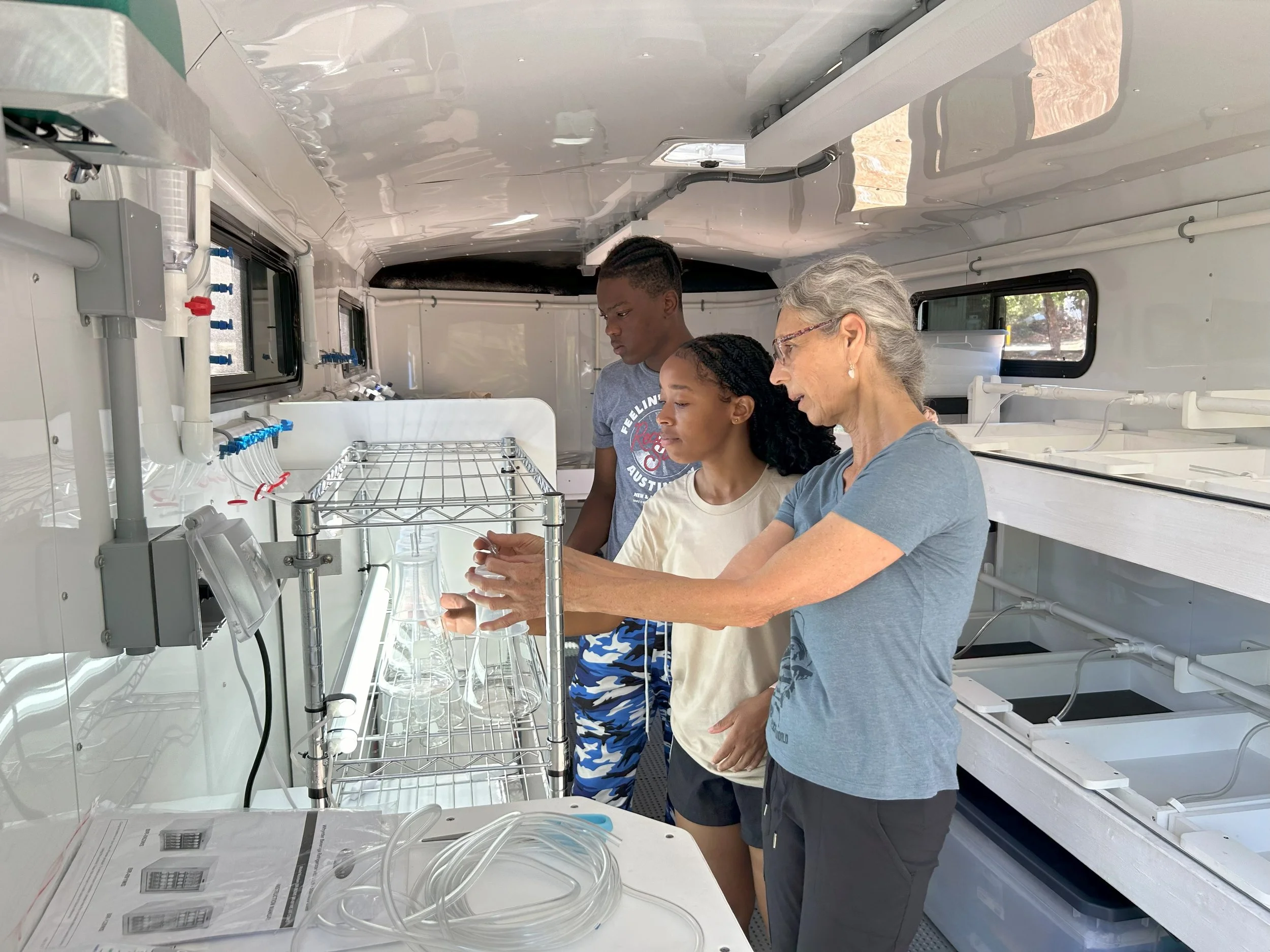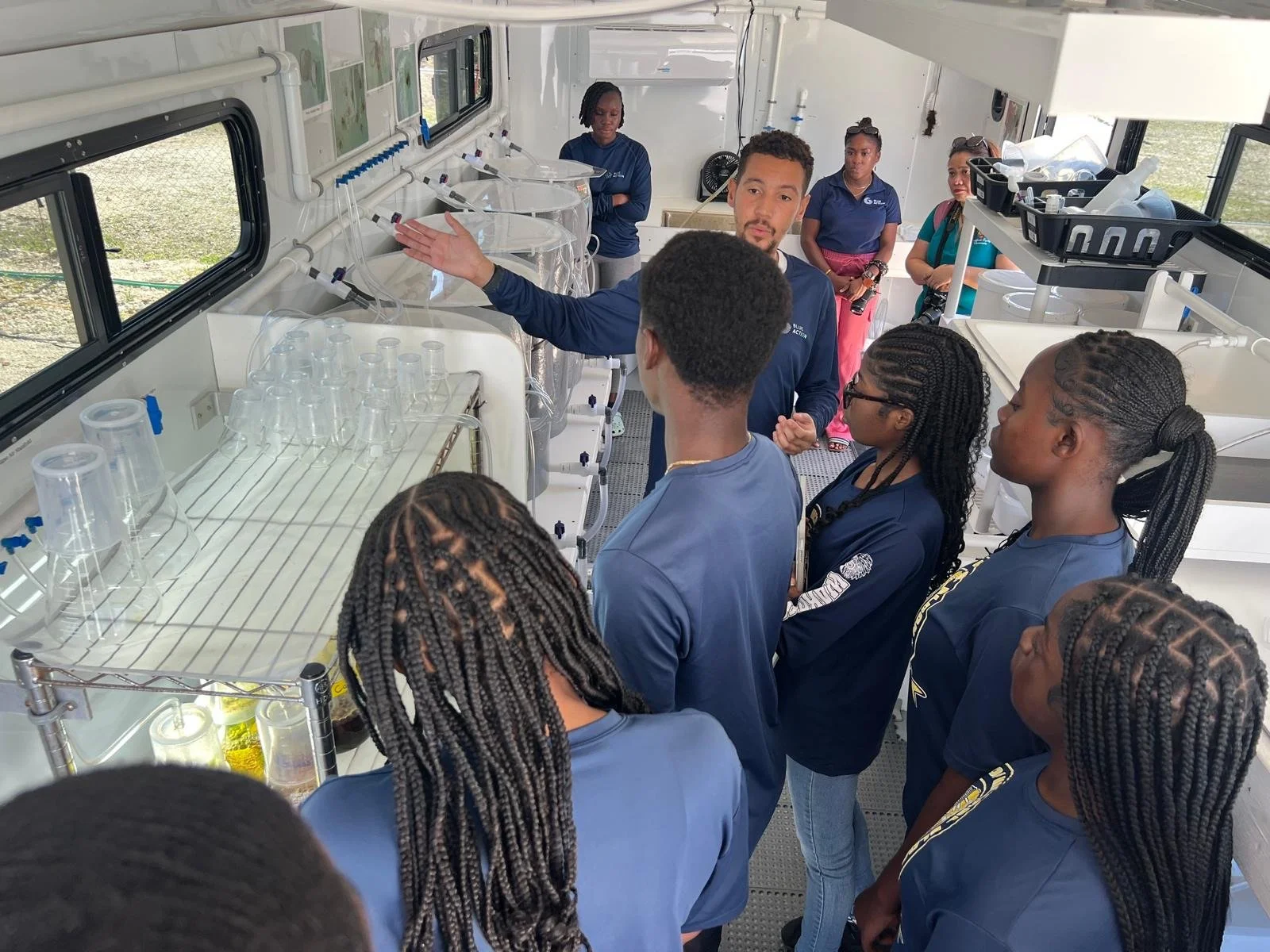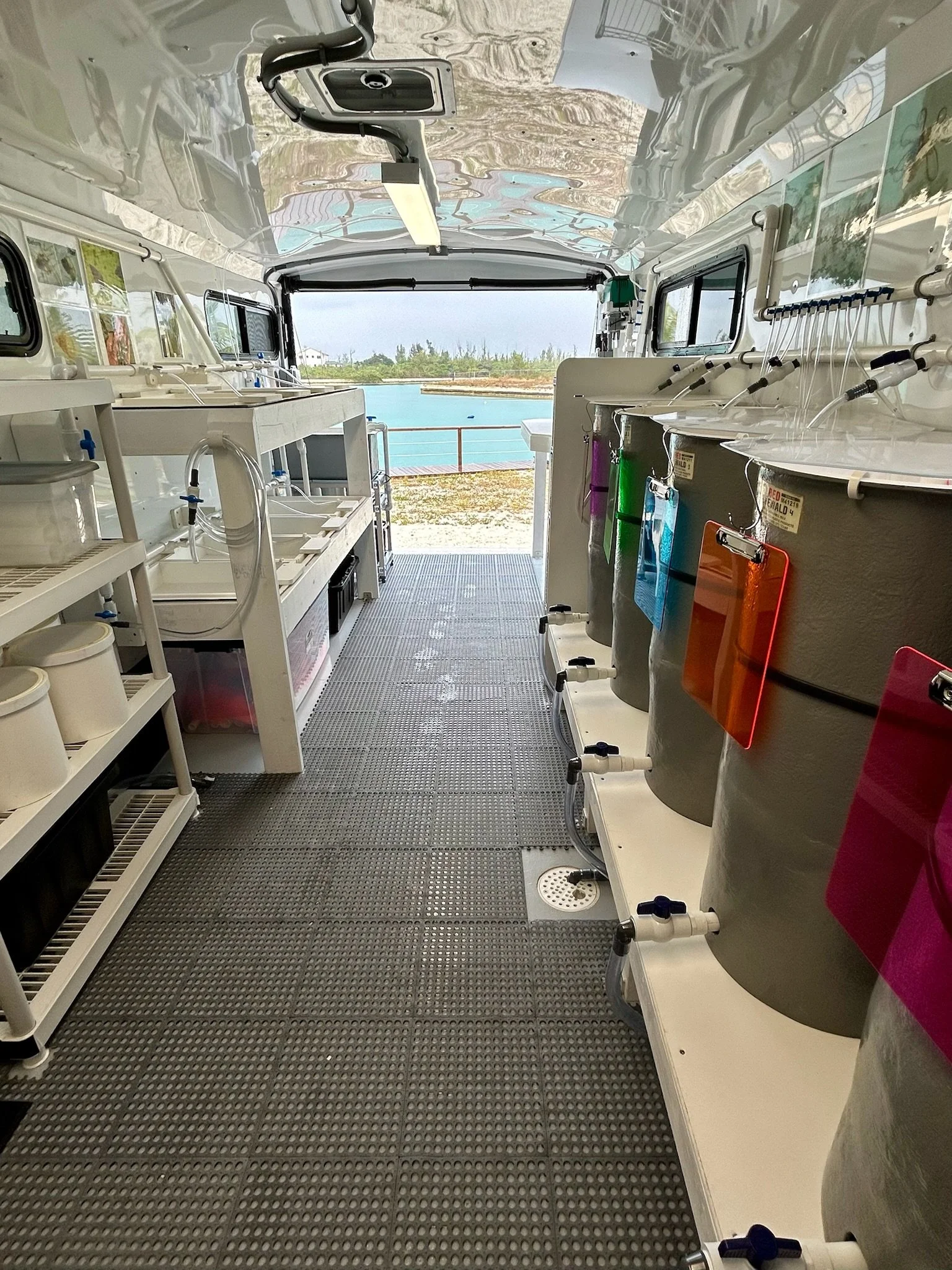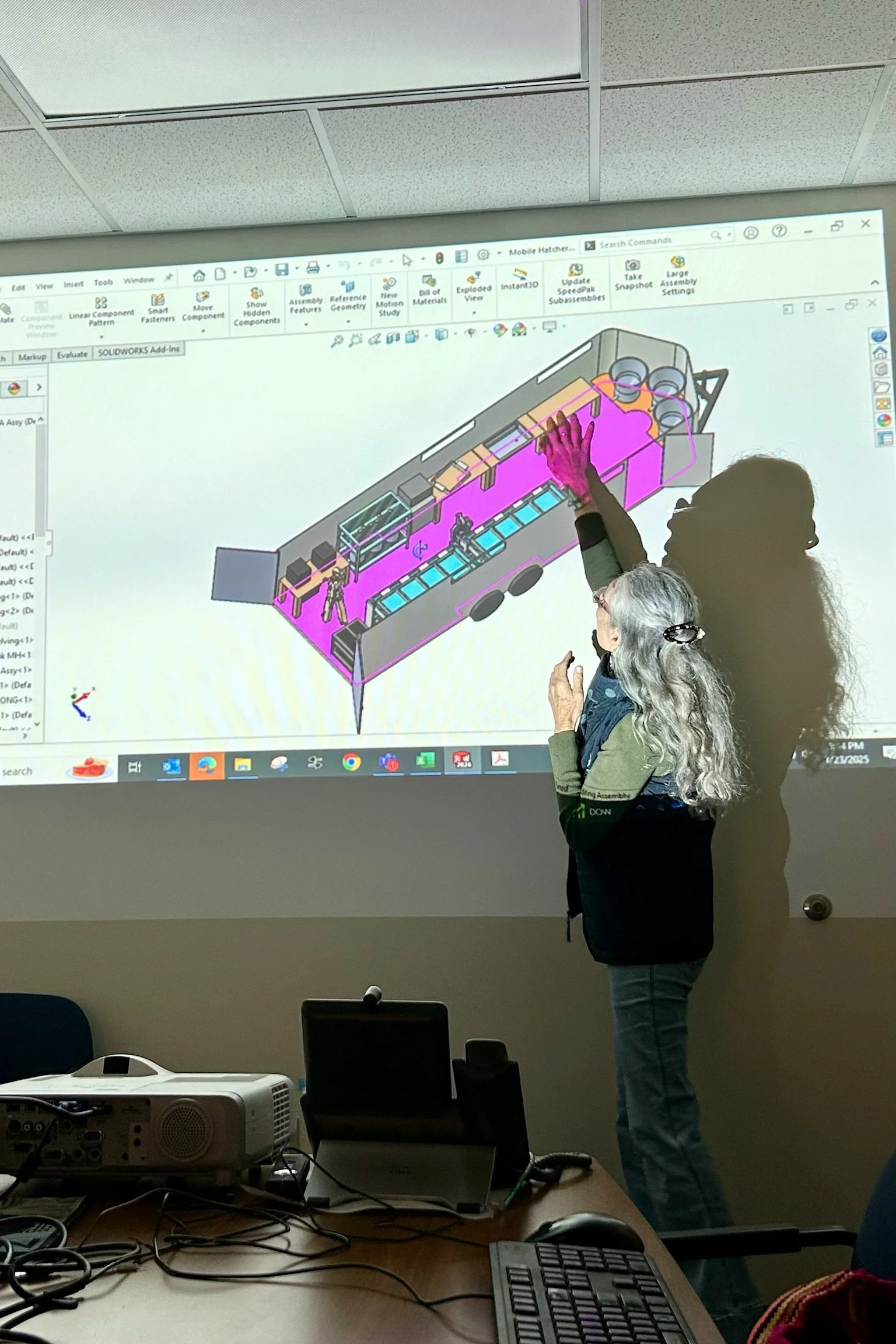Design Lessons from a Queen Conch Mobile Lab
Dr. Megan Davis, director of FAU Queen Conch Lab, shows Jamaica team members how to set up algal cultures for feeding queen conch in the Mobile Lab that is stationed at UWI Discovery Bay Marine Lab. Image credit: Robinson Bazurto
As climate challenges and overfishing strain global marine ecosystems, the need for agile, community-rooted science infrastructure has never been greater. A recent expansion of Florida Atlantic University’s Queen Conch Mobile Lab—made possible by a grant from Chef José Andrés’ Longer Tables Fund—is offering just that: a replicable model for small-footprint, high-impact conservation work.
Located on the island of Eleuthera in The Bahamas, the newly expanded mobile aquaculture facility is a collaborative effort between FAU’s Harbor Branch Oceanographic Institute and The Island School’s Cape Eleuthera Institute (CEI). It’s designed not only to raise threatened queen conch (Aliger gigas) for restoration, but also to train students, engage communities, and provide lessons for other institutions building or expanding specialized research spaces.
Designing with purpose: adaptability, accessibility, and education
Unlike traditional hatchery labs, the Queen Conch Mobile Lab is built for mobility, resilience, and education. Measuring 26 feet by 8 feet—6 feet longer than previous models—the expanded unit offers additional counter space for microscope work, microalgae culture, and data collection. It houses specialized equipment including larval and juvenile tanks, UV sterilizers, aerators, and built-in air conditioners. For the first time, the lab also connects to a solar- and wind-powered campus grid, underscoring a commitment to renewable infrastructure.
“This expanded capacity allows us to grow more conch juveniles while also supporting more students, interns, and visitors inside the lab,” Dr. Megan Davis, director of the Queen Conch Lab at FAU Harbor Branch, and assistant director Becky Holt told Lab Design News in a joint statement. “We collaborated closely with CEI to make sure the design supported their needs for education and research.”
Grand Bahama Queen Conch Mariculture Center. Kristian Moree, aquaculture technician, shows local high school students the Mobile Lab. Image credit: Tony Johns
Grand Bahama Queen Conch Mariculture Center—inside the Mobile Lab. Image credit: Dr. Megan Davis
Key design upgrades, such as replacing a ramp with wider barn doors and integrating a plug-and-play seawater plumbing system, reflect lessons learned from earlier mobile lab deployments. A standout feature is the lab’s mobility: it can be relocated in the event of a hurricane—essential for island-based operations.
Lessons for other lab projects: modularity and community engagement
For organizations planning new lab facilities, Davis and Holt emphasize that you don’t need a large footprint to make a big impact. “One of the greatest strengths of the Mobile Lab is its adaptability,” they say. “It allows us to deploy aquaculture tools in locations that don’t have the infrastructure to support a traditional lab.”
The lab is assembled at FAU’s state-of-the-art fabrication and machine shop, ensuring quality control before it ships by sea and land to its final destination. There, it's connected to a seawater source and made operational within days—a far cry from the months or years required to build permanent aquaculture facilities.
Institutions considering similar efforts should focus on:
Strategic partnerships: “We always begin with a local partner on the ground,” said Holt. “This ensures the lab integrates with the community and local environment.”
Operational simplicity: Features like built-in aerators, overhead lighting, and simple plumbing layouts reduce maintenance burdens and training needs.
Training infrastructure: FAU provides both in-person and virtual instruction, plus a bilingual operations manual and online coursework. This helps ensure long-term sustainability, even after FAU’s initial involvement tapers off.
Addressing real-world aquaculture challenges
Raising queen conch isn’t easy. Clean ocean water, stable temperatures, and high-quality microalgae are essential for success. The Mobile Lab builds on over 40 years of aquaculture experience from Dr. Davis and integrates improvements learned through deployments in Jamaica, Curaçao, Puerto Rico, and other sites.
“Our design is based on what works,” say Davis and Holt. “We’ve tested both stationary and mobile labs and refined our approach to make sure practitioners have everything they need to succeed.”
The newest lab will help FAU scale its production goal of 2,000 juvenile conch per year and allow the animals to grow to a larger size before outplanting. The team is also planning upgrades like larger floor drains to improve daily operations.
Dr. Megan Davis showing the layout of the Cape Eleuthera Mobile Lab. Image credit: Robinson Bazurto
With over 1,400 students visiting The Island School annually and more than 1,500 community members expected to engage through outreach events, the new lab goes far beyond science. It offers a tangible way for locals—including fishermen—to understand and participate in conch restoration.
“Seeing the early life stages of queen conch is something most people never experience,” say Davis and Holt. “By making this visible and hands-on, we’re fostering a sense of stewardship that will be essential to the species’ survival.”
Takeaways for lab planners and funders
For those looking to secure support for new research spaces, Davis and Holt offer this advice: focus on flexibility, impact, and partnership. “Our mobile concept has allowed us to accelerate deployment and build momentum,” say Davis and Holt. “It shows that you can create meaningful change without waiting years for a brick-and-mortar facility.”
The Queen Conch Mobile Lab is more than a successful aquaculture tool—it’s a blueprint for scalable, community-embedded science. With continued funding from partners like the Longer Tables Fund and the support of regional stakeholders, this model stands ready to be adapted for other species and conservation priorities across the Caribbean and beyond.
Cover image: Great Exuma Mobile Hatchery. Dr. Megan Davis, FAU Harbor Branch, and Sasha Collie, Aquaculture Manager with Bahamas National Trust, discussing techniques for growing queen conch. Image credit: Robinson Bazurto




